150 years of the Paris Commune
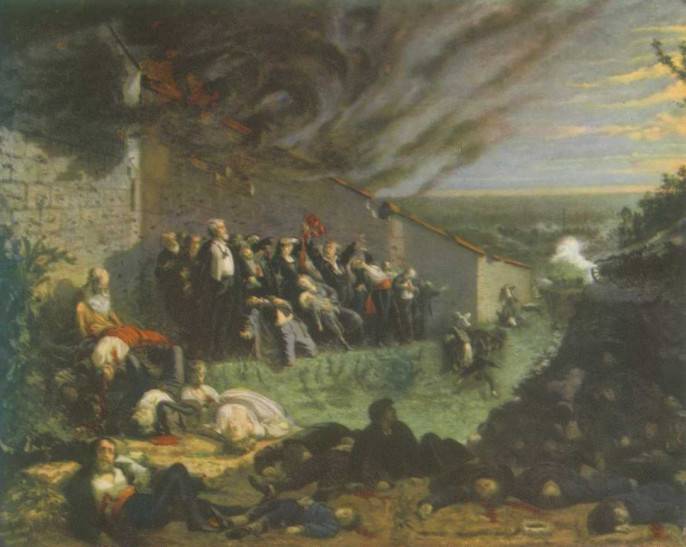
Ernest Picchio. "Shooting of the Parisian Communards"
French disaster
The years 1870-1871 were a difficult time for France. Emperor Napoleon III, who considered France the leader of Western Europe, allowed the country to be drawn into a war with Prussia. The Prussian chancellor Bismarck, who united Germany with "iron and blood", did everything to provoke France. Prussia needed a victory over France to complete the unification of Germany. Prussia was well prepared for the war. And the Second Empire overestimated its strength, underestimated the enemy and was not ready for war.
The French tried to attack, but the beginning of the war showed that their army was not ready for active hostilities. The command was unsatisfactory, as was the general organization and preparation of the rear and reserves. The German army acted like a well-coordinated fighting mechanism, winning victory after victory. Marshal Bazin's French army was blockaded at Metz. After the depletion of reserves, she surrendered on October 29 (200 thousand army ceased to exist).
The second French army tried to free the first, but was itself trapped in Sedan. The fortress was not ready for a long siege. The Germans occupied the commanding heights and could simply shoot the enemy. On September 1, 1870, the Sedan catastrophe followed. The 120-strong French army ceased to exist. Over 80 thousand French soldiers, led by MacMahon and Napoleon III, surrendered. After that, France lost most of its armed forces. There was only one (13th) corps, which was supposed to strengthen the army of MacMahon, he retreated to Paris.
On September 3, Paris learned about the Sedan disaster. The people's dissatisfaction with the regime of Napoleon III escalated into mass unrest. Crowds of workers and townspeople demanded the overthrow of the emperor. On September 4, the overthrow of the emperor, the formation of a republic and the creation of a provisional government were announced. Simultaneously, similar events took place in other large cities in France. The September revolution was the fourth revolution in France. General Trochu, commander of the Paris Army, became the president of the interim government. The new government offered Prussia peace. But due to the excessive demands of the Germans, the agreement did not take place.
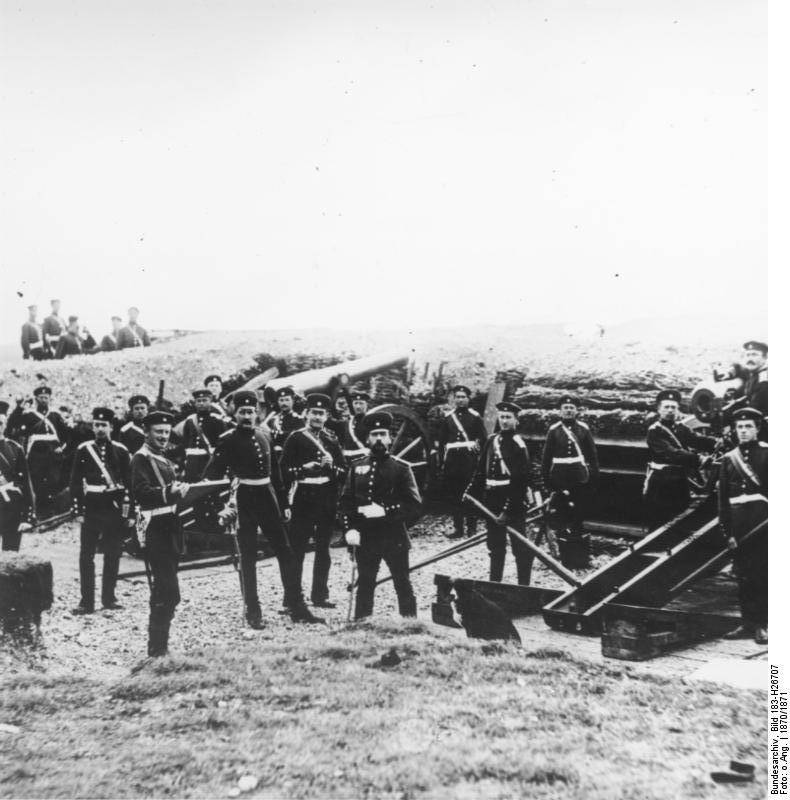
Prussian artillery battery near Paris
Capitulation of Paris
On September 15-19, 1870, the German corps laid siege to Paris. The Prussian command refused to storm, since the battle for such a huge city could lead to heavy losses. The bombing was also abandoned, since artillery shelling would have led to the deaths of many civilians. And this could cause a lot of public noise and interference from England or Russia. The Germans decided to confine themselves to the blockade so that the city would run out of supplies of food and fuel.
The French army had a numerical advantage: 350 thousand French (including 150 thousand militia) against 240 thousand Germans. However, the French command was weak, most of the troops, including the National Guard, were of low combat effectiveness. The French could defend themselves, relying on the forts and structures of the capital, but they could not successfully attack. Attempts by the French to break the siege were unsuccessful. In addition, the command of the Paris army was confident that the siege of the city would fail. Sooner or later, the Germans, under the blows of other French armies that were formed in unoccupied parts of the country, under pressure from other great powers, or because of problems in the rear (lack of supplies, illness, winter, etc.), had to lift the siege.
Trochu and other generals, dignitaries more than the Germans, feared "the enemy in the depths of Paris." That is, a social explosion. There were reasons for this fear: on October 31, 1870 and January 22, 1871, uprisings began demanding the proclamation of the Commune, but they were suppressed. Therefore, the French command did not use the available opportunities to strengthen the defense of Paris or the offensive potential.
Thus, despite a number of military disasters and the general unfavorable course of the war, the French had a chance to knock the enemy out of the country. The government controlled 2/3 of the country, could form new corps and armies, call on the people to resistance, partisanship. At sea, France had complete superiority, her fleet could create big problems for German trade. World public opinion was gradually tilted in favor of France. Germany's tough political demands (the annexation of the French provinces of Alsace with Lorraine, a huge indemnity) and the methods of the Prussian military irritated the world. Sooner or later England, Russia and Italy, and after them Austria, could side with France.
However, it took time and sacrifice ("to fight to the death"). The prevailing opinion among the French elite is that it is better to immediately conclude a "bawdy" peace than to get a new revolution. The command of the Paris army decided to surrender. On January 28, 1871, Paris threw out the white flag. In February, the Germans even staged a victory parade in the French capital.
72 days that shook the world
With the consent of the Germans, elections to the National Assembly (lower house of parliament) were held in France in February. The victory was won by the supporters of an immediate peace with Germany. A new parliament gathered in Bordeaux, which formed a coalition government of monarchists and republicans. The conservative politician Adolphe Thiers was elected president. On February 26, at Versailles, a preliminary peace was signed with Germany. On February 28, the National Assembly approved the peace treaty. On May 10, peace was finally signed in Frankfurt am Main. France lost two provinces and paid a huge contribution. The German Empire became a great power.
The new government, led by Thiers, canceled deferred payments and salaries for the guardsmen, exacerbating the plight of thousands of people. Then the authorities tried to disarm the National Guard, workers' districts (districts) of the capital and arrest members of the Central Committee of the National Guard. This attempt, made on the night of March 18, 1871, failed. The soldiers went over to the side of the guards, with whom they together defended the city from the Germans. General Lecomte, who ordered the shooting at the crowd, and the former commander of the National Guard, Clement Thoma, were shot. The rebels captured government offices, Thiers fled to Versailles. The red banner of the socialist revolution was raised over Paris. Several cities followed Paris, but there the revolts were quickly suppressed.
On March 26, elections were held for the Paris Commune (86 people). It was proclaimed on March 28th. The commune consisted mainly of representatives of the working class, office workers and the intelligentsia. There were no industrialists, bankers and stock speculators among them. The leading role was played by socialists, members of the 1st International (about 40 people). Among them were the Blanquists (in honor of the socialist L. Blanca), Proudhonists, Bakuninists (the direction of anarchism), people professing the ideas of Marxism. The commune was ideologically divided into two factions: the "majority", adhering to the ideas of neo-Jacobinism, and the Blanquists, the "minority."
The new authorities declared Paris a commune. The army was abolished and replaced by an armed people (National Guard). The church is separated from the state. The police were liquidated, and their functions were transferred to the reserve battalions of the guard. The new administration was created on a democratic basis: electivity, responsibility and changeability, collegial government. The commune eliminated bourgeois parliamentarism and the division into branches of government. The commune was both a legislative and an executive body.
The functions of the government were taken over by 10 committees of the Commune. The general management of affairs was taken over by the Executive Commission (then the Committee for Public Safety). The commune took a number of measures to alleviate the material situation of the common people. In particular, the abolition of rent arrears, a 3-year installment plan for the repayment of commercial bills, the abolition of arbitrary fines and illegal deductions from the wages of workers and employees, a minimum wage was introduced, workers' control at large enterprises, public works for the unemployed, etc.
The indemnity to Germany was to be paid by the perpetrators of the war: former ministers, senators and deputies of the Second Empire.
The commune launched a struggle to introduce free and compulsory education. Schools, canteens and first aid posts were opened in different parts of Paris. Assistance was allocated to the families of the dead guardsmen, lonely elderly people, schoolchildren from poor families, etc. That is, the Commune became the forerunner of modern socially-oriented politics, the "welfare state." Also, women took a great part in the organization and activities of the Commune. The rise of the women's movement began: the demand for equality in rights, the introduction of education for girls, the right to divorce, etc.
The communards were able to establish a peaceful life in the city.
Thus, the Paris Commune opposed the strange "republic without a republic" (the National Assembly was dominated by monarchists of different factions), against the attempt to restore the monarchy (according to contemporaries, such plans were hatched by Thiers).
It was a patriotic challenge to the capitulatory policy of the Versailles government. Speaking out against social injustice when the plight of the common people was sharply worsened by the war. Also, the organizers of the "communal revolution" dreamed of spreading the experience of democratic self-government in Paris throughout the country, and then founding a social republic.
For the Versaillese, these were just bandits, robbers and scoundrels who must be burned out with a red-hot iron.
"Bloody week"
The confrontation between two Frances began: "white" and "red". The "Whites", led by Thiers, settled in Versailles and did not intend to retreat. The Germans, interested in stability and preservation of peace in France (the Thiers government concluded a peace beneficial for Germany), helped the Versailles. The Germans released tens of thousands of French prisoners who were sent to replenish the Versailles army.
The confrontation was irreconcilable: both sides actively used terror. The Versailles shot prisoners, the Communards promised that three people would be killed for each executed. Both sides issued decrees on the trial and execution of prisoners, the organization of military tribunals, the execution of deserters, the arrest of prominent figures, etc. Communards identified spies and traitors.
As a result, the Communards, in wartime, were engaged in intrigues, disputes, trifles, nonsense, scattered their attention, could not concentrate all their forces on the war with Versailles. They could not create a full-fledged and efficient Parisian army. The rear structures worked poorly, there were few experienced commanders. A negative role was played by the lack of one-man command: the Military Commission, the Central Committee of the National Guard, the Military Bureau of the Districts, etc. tried to lead. During the battle in the city itself, each community fought on its own. The military leadership headed by Cluseret (from April 30 - Rossel, from May 10 - Delecluse) adhered to passive defensive tactics. In addition, the Commune was unable to establish contacts with possible allies in the province and other cities.
On April 2, 1871, the Versaillese attacked. The communards tried to counterattack and take Versailles. But the counterattack was poorly organized, and the rebels were thrown back with heavy losses. On May 21, the 100-strong Versailles army broke into Paris. Government forces advanced rapidly, occupying one area after another. On May 23, Montmartre fell without a battle.
Arson of government buildings associated with the Second Empire and the government of Thiers began. The Tuileries Palace was badly damaged, the city hall was burned. Many communards were demoralized, weapon, changed into civilian clothes and fled.
The Versailles occupied most of the city. On May 25, the last rebel commander, Delecluse, was killed at the barricades. Versailles shot the captured Communards. On May 26, the revolutionaries shot their prisoners - captured Versaillese and arrested priests. On May 27, the last major centers of resistance fell - the Buttes-Chaumont park and the Père Lachaise cemetery. On the morning of May 28, the last defenders of Père Lachaise (147 people) were shot at the northeastern wall (Wall of the Communards). On the same day, the last groups of insurgents were defeated.
The last week of the fighting for Paris was called "bloody". On both sides, fighters died in the streets and barricades, the detainees were shot out of revenge or on suspicion. On the part of the Versaillese, punitive detachments were active. Mass executions took place in barracks, parks and squares. Then the courts-martial began to operate. Thousands of people were killed.
From the point of view of organization: ideological, military-political, social and economic, the revolution was at the level of a "kindergarten". However, the message about social justice was so powerful that the owners of capital, factories, banks and other large property and their political servants were so afraid that they responded with the most severe terror. Neither women nor children were spared.
Up to 70 thousand people became victims of counter-revolutionary terror (executions, hard labor, prison), many people fled the country.
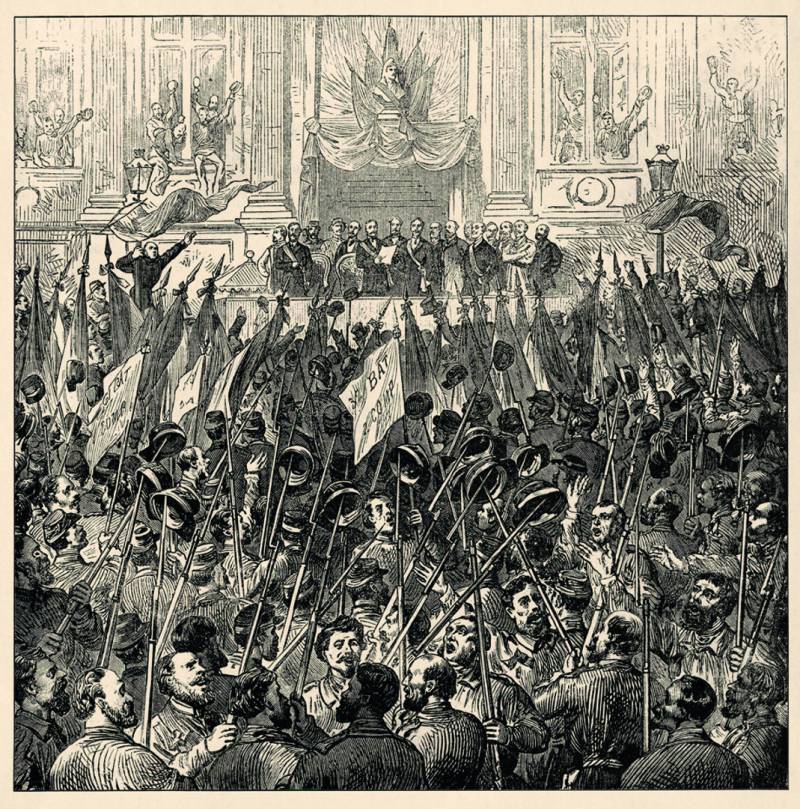
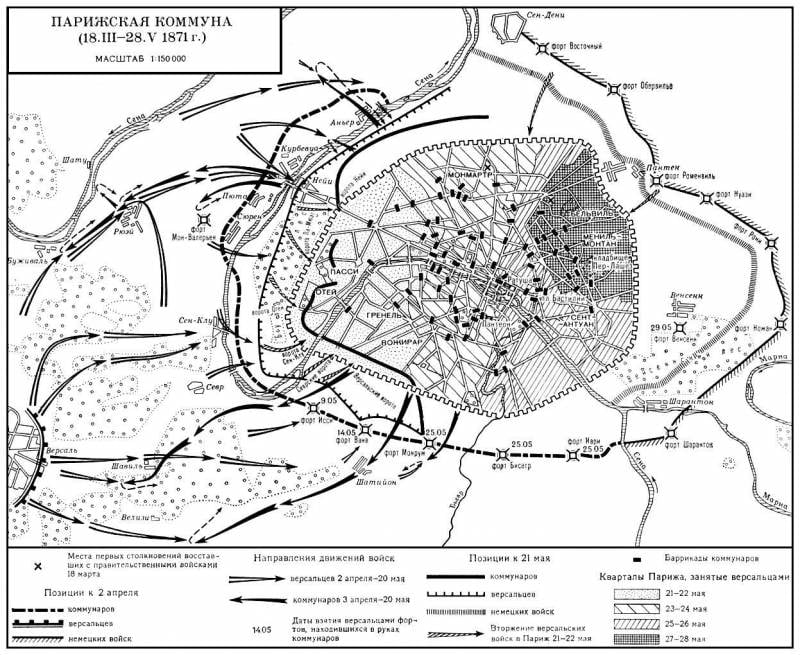
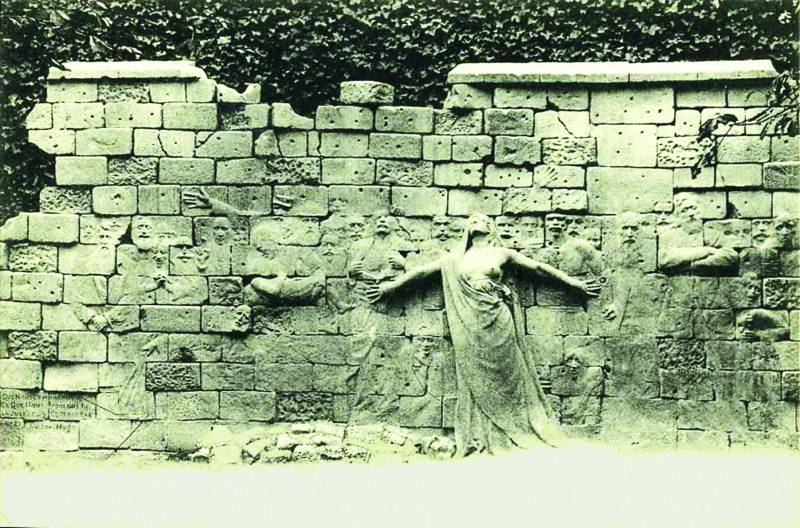
Information